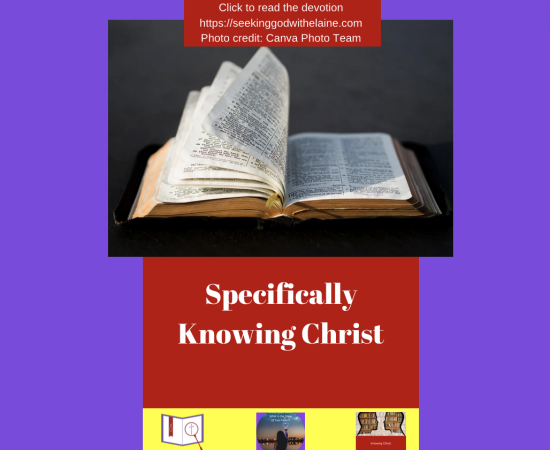Knowing Christ means we have to specifically know Him. This devotion looks at knowing Him as the Christ of the cross and as God so that we can grow our faith and trust.
Nuggets
- Knowing Christ means nothing if we ignore the fact that Christ was crucified.
- Knowing Christ means nothing if we ignore the fact that Christ is God.
- Knowing Christ means nothing unless we grow our faith and trust.

For the last several devotions, we have been talking about knowing Christ. Christ has to be the object of our knowledge.
When we have knowledge of Who Christ is, we grow our faith. That is the purpose of sanctification.
Let's Put It into Context
Here is a running list of nuggets for the series.
I used Lyth and Burder’s The Excellency of the Knowledge of Christ as the foundation of the devotion.
Resource
Knowledge of Christ’s Character
“For I decided that while I was with you I would forget everything except Jesus Christ, the one who was crucified” (I Cor. 2: 2 NLT)
Knowing Christ means nothing if we ignore the fact that Christ was crucified.
Paul was like a broken record. He had one message he told over and over again.
Christ died to save us from our sins.
How that was applied may have been modified to fit his audiences’ needs, but Paul never strayed from the fact that it all was dependent on Jesus and what He had done for us.
Williamson pulled out the verses that show us what Paul wasn’t doing.
- “For Christ did not send me to baptize, but to preach the gospel — not with eloquent wisdom, so that the cross of Christ will not be emptied of its effect” (I Cor. 1: 17 CSB)
- “For we are not proclaiming ourselves but Jesus Christ as Lord, and ourselves as your servants for Jesus’s sake” (II Cor. 4: 5 CSB)
- “but we preach Christ crucified, a stumbling block to the Jews and foolishness to the Gentiles” (I Cor. 1: 23 CSB)
- “My speech and my preaching were not with persuasive words of wisdom but with a demonstration of the Spirit’s power” (I Cor. 2: 4 CSB)
Resource
So, what was Paul’s message?
- “Therefore, let it be known to you, brothers and sisters, that through this man forgiveness of sins is being proclaimed to you” (Ac. 13: 38 CSB).
- “Now as he spoke about righteousness, self-control, and the judgment to come, Felix became afraid and replied, ‘Leave for now, but when I have an opportunity I’ll call for you’” (Ac. 24: 25 CSB).
- “that the Messiah must suffer, and that, as the first to rise from the dead, he would proclaim light to our people and to the Gentiles” (Ac. 26: 23 CSB).
- “proclaiming the kingdom of God and teaching about the Lord Jesus Christ with all boldness and without hindrance” (Ac. 28: 31 CSB).
Did you catch that? Those verses were written by Luke, not Paul. Luke was an eyewitness to what Paul was preaching.
There was nothing more important to Paul than getting this message out to the masses — anyone who would hear.
There is no limitations as to who can hear. Young, old, rich, poor — all are free to hear what Jesus has done for them.
But we are talking about Jesus, not us.
Jesus didn’t show up in Israel as they thought He would. They thought He would be a military Messiah. They never envisioned His death on the cross.
In other words, they — and we — have to know the real Jesus.
We can’t forget that, at one time, Paul didn’t know the real Jesus. In fact, instead of believing He was the Messiah, Paul persecuted the early church.
Spurgeon said something interesting. He wrote, “If the apostle had aimed at pleasing an intelligent audience, or had designed to set himself up as a profound teacher, he would naturally have looked out for something a little more new and dazzling. A select Church of culture would have assured him that such preaching would only attract the servants and the old women; but Paul would not have been disconcerted by such observations, for he loved the souls of the poorest and feeblest: and, besides, he knew that what had exercised power over his own educated mind was likely to have power over other intelligent people.”
Resource
We aren’t going to establish a relationship with God because of our intelligence or culture. It will take faith.
Knowledge of Christ’s Office and Work
“So the Word became human and made his home among us. He was full of unfailing love and faithfulness. And we have seen his glory, the glory of the Father’s one and only Son” (Jn. 1: 14 NLT)
Knowing Christ means nothing if we ignore the fact that Christ is God.
There are many verses in the Old Testament that prophesy the birth of the Messiah. But it is more than just He was born.
It is about Who He is. “I and the Father are one” (Jn. 10: 30 ESV).
Yes, God was with us when Jesus was on earth. He left Heaven and came to be with us.
I love how de Pressense explained it. He wrote, “… He is a fabulous symbol of that union of man with God realized in the development of reason.”
Resource
Jesus wasn’t just God any more than He was just man. He was 100% God and 100% man.
One thing we might gloss over sometimes is that Jesus had to become wholly human so He could suffer and die. He had to be able to be tempted so He could choose not to sin.
During His ministry, Jesus did a lot to heal the sick and feed the hungry. However, His primary mission was to save them from their sins.
Some like to quote John 3: 17. “For God did not send his Son into the world to condemn the world, but in order that the world might be saved through him” (Jn. 3: 17 ESV). They think this gives them permission to keep on sinning.
However, it doesn’t. They don’t go on to read the next verse. “Whoever believes in him is not condemned, but whoever does not believe is condemned already, because he has not believed in the name of the only Son of God” (Jn. 3: 18 ESV emphasis added).
God’s priority is our spiritual condition. That is why He sent His Son to pay the penalty for the price of our sins.
We have to specifically know Christ as our Savior and Redeemer. If we don’t, we are condemned because we do not believe.
There was another reason Jesus came down to earth. The Pharisees had some things wrong. How many verses say, “You have heard it said … but I say …”?
We have to know God the right way. Our way may not be that for which He is looking.
Knowledge of Christ Includes Faith
“Those who know your name trust in you, for you, O LORD, do not abandon those who search for you” (Ps. 9: 10 NLT)
Knowing Christ means nothing unless we grow our faith and trust.
Not too long ago, we had a series about In Jesus’ Name. We talked about doing a lot of things for Him. However, if we don’t do them in His name, we haven’t gotten down to the heart level.
To read a devotion in the In Jesus’ Name series, click the button below.
Cook explains what knowing the name of God means. He wrote, “What does that imply, but to know all that is included in the revelation of the nature and attributes of Almighty God?”
Resource
I know. I feel like a broken record. It isn’t just surface knowledge. It is what God — and Jesus — reveal about Themselves that is important.
So, knowledge comes by revelation. What they reveal is their power, righteousness, and goodwill.
The revelations come to us because of faith and trust. Faith is a gift from God and a work of the Spirit that enhances the conviction that the doctrines revealed in God’s Word are true, even if we do not understand all aspects of them, a belief which impacts our lives and distinguishes us from others. Trust is assurance that the promises of God are true.
Glossary
Knowledge, faith, and trust are interconnected. Piston explained it this way. He wrote the condition of trust is “Knowledge of Jehovah’s name, true heartfelt and experimental knowledge.”
Resource
Trust has an element of approval associated with it. We agree and accept what we learn about God. We gain knowledge by loving Him.
Let’s look at it this way. Lyth and Burder talked about knowing Jesus in their sermon. Yet they used this Old Testament verse as a discussion point.
Why? Think about it. Jesus was God’s witness. “Jesus answered: ‘Don’t you know me, Philip, even after I have been among you such a long time? Anyone who has seen me has seen the Father. How can you say, “Show us the Father”?’” (Jn. 14: 9 NIV).
Remember, we just had the verse that said God and Jesus were the same. So, it fits we see One, we see the Other.

Making the Connections
I love what Williamson said. He wrote, “Grand is the starry world above, but grander is the Cross.”
Resource
Heaven is the starry world above. Many — even many non-believers — can tell of the splendors of Heaven. That is why they want to go.
Unfortunately, they try to do an end-around to bypass Jesus. They think they can get there in their own merits or character.
Unless they acknowledge Christ on the cross, they won’t see the shores of Heaven except from afar.
To read a related devotion, click the button below.
The cross is essential for our salvation. Look what de Pressense said. He wrote, “Had Christ swept away every social abuse and satisfied every national need, the human heart would still have yearned for a [Savior].
Resource
If Jesus were just a social savior, we would still be searching. Sin would have no way to be checked.
We would be searching because there would be no way we could restore our relationship with God. That is what our hearts yearn to do.
How Do We Apply This?
Be as focused and determined to share the gospel as Paul was.
Use the knowledge revealed to us to grow faith and trust.
Resource
Father God. Reveal Yourself to us. We want to gain knowledge of You. Help us to use this knowledge to grow our faith and trust in You. Amen.
What do you think?
Leave me a comment below (about this or anything else) or head over to my Facebook group for some interactive discussion.
If you don’t understand something and would like further clarification, please contact me.
If you have not signed up for the email daily or weekly providing the link to the devotions and the newsletter, do so below.
If God has used this devotion to speak with you, consider sharing it on social media.